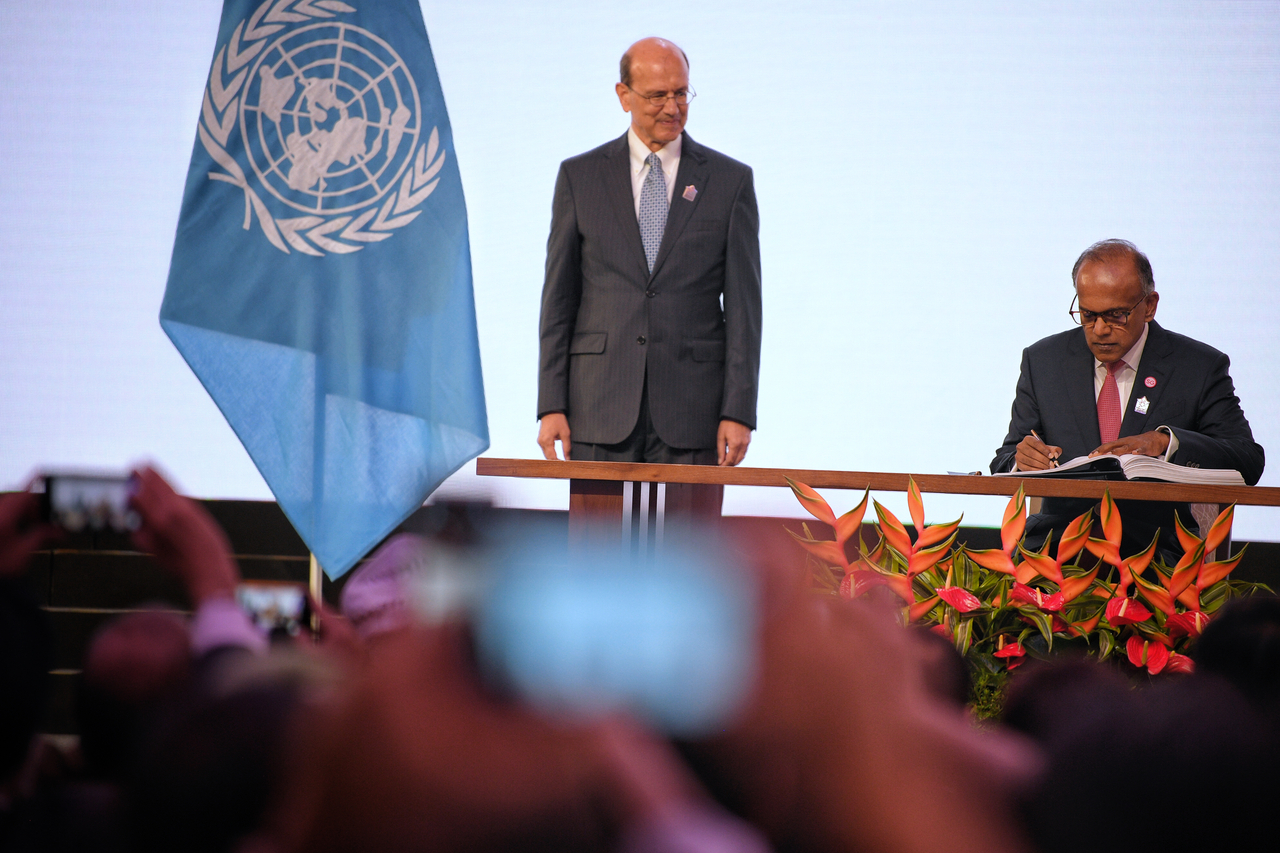Singapore Convention on Mediation more important amid Covid-19 pandemic: Shanmugam
Sign up now: Get ST's newsletters delivered to your inbox

Law and Home Affairs Minister K. Shanmugam during the Singapore Convention on Mediation signing ceremony in August 2019.
PHOTO: ST FILE
Follow topic:
SINGAPORE - There is even greater need for a good dispute resolution mechanism now, with the Covid-19 pandemic, rising geopolitical tensions and trade protectionism issues leading to more disputes, said Law and Home Affairs Minister K. Shanmugam.
In this context, the Singapore Convention on Mediation has taken on more significance, he said on Tuesday (Sept 7). The United Nations' international trade dispute treaty came into force in September last year.
A total of 54 countries have signed and seven have ratified the convention.
Mr Shanmugam said he hoped more countries would come on board, since the effectiveness of the convention depends on how many parties ratify it.
"Covid-19 has shown us how quickly disputes can occur and how unexpected the circumstances can be that can lead to disputes," he said at the UN Commission on International Trade Law (Uncitral) Academy, a two-day mostly online conference headlining the Singapore Convention Week.
Amid the Covid-19 pandemic, businesses have been unable to fulfil their contractual obligations, and assumptions made before the pandemic have also changed completely, he noted.
At the same time, there have been increased civil unrest and political instability across the world, rising geopolitical tensions and greater trade protectionism.
These trends have led to fractured world markets, a more volatile business environment, and greater commercial risks for businesses, said Mr Shanmugam.
"What's happening now is damaging to economies around the world. And the companies and consumers pay the price," he added.
Mr Shanmugam noted that the Singapore convention will make mediation more efficient, more effective, and also give more certainty.
"It gives parties much greater confidence that mediation can be used to resolve cross-border disputes. It also helps to facilitate trade and commerce, and it's good for the global economy overall."
The convention, formally known as the United Nations Convention on International Settlement Agreements Resulting from Mediation, makes it easier for mediated agreements to be enforced in acceding countries.
Without the treaty, a settlement agreement made in one country may have no legal force in another, and parties would have to go to court to have it enforced.
Singapore will work with Uncitral to enhance the utility of the Singapore Convention on Mediation and to provide technical assistance to countries, Mr Shanmugam said.
The Uncitral Academy, which ends on Wednesday, comprises fireside chats and panel discussions with leading practitioners of mediation and business leaders.
Uncitral secretary Anna Joubin-Bret, speaking at the opening dialogue on Tuesday with Minister for Culture, Community and Youth Edwin Tong, said she hoped the conference would help raise awareness of mediation among the business community.
Business leaders and in-house legal counsel would then consider it instead of turning to more confrontational methods of dispute resolution such as litigation, she said.
Ms Joubin-Bret added that she had often felt in the past that she was "preaching in the desert" when she was speaking about mediation, and people would often roll their eyes at her.
The Singapore Convention on Mediation, however, has contributed to a blossoming of mediation and "nobody rolls their eyes any more", she added.
Mr Tong, who is Second Minister for Law, said that mediation institutions need to be more attuned to the needs of businesses in the different sectors, and added that there was a need to train up more quality mediators.
The Government is working with organisations such as the Singapore International Dispute Resolution Academy and Singapore International Mediation Centre in this respect.
Mr Tong also noted that mediation has become a lot more popular as a way to resolve community disputes in Singapore.
Citing the Community Mediation Centre, he said that of all the disputes that underwent mediation, 80 per cent were resolved.

